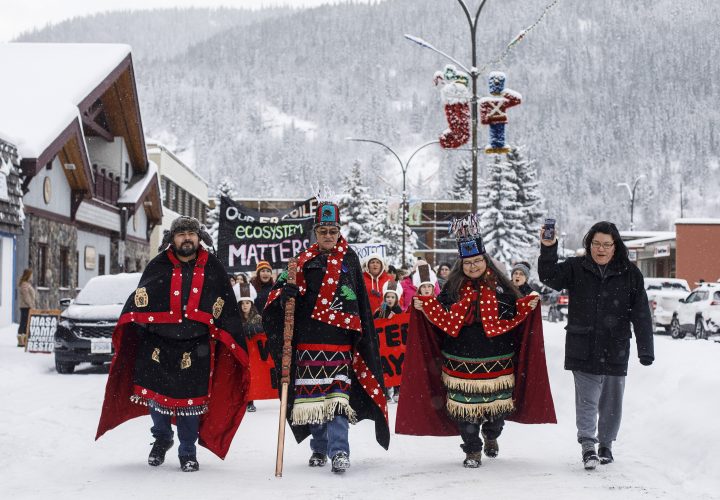UPDATE: Hereditary Chief Na’moks told Global News Wednesday that an all-clan meeting had been scheduled. He later clarified that such a meeting has only been proposed but not yet agreed to. This article has been updated to reflect the clarification.

For the first time in a generation, the Wet’suwet’en hereditary leadership is considering holding all-clan meetings, as the dispute over the Coastal GasLink pipeline inspires protests across the country.
Chief Na’moks (John Risdale) of the Tsayu Clan said hereditary chiefs will be holding a series of meetings in the coming days and will be discussing the prospect of an all-clan meeting.
The all-clan meeting was proposed in a letter from Andrew George, a wing chief of the Grizzly House, amid concern for the safety of youth participating in the national solidarity protests, reports APTN.
Na’moks said all-clan meetings have taken place over smaller issues such as deaths in the community, but “on an issue like this, it’s the first in my lifetime.”
But Na’moks said the outcome of the discussions is not in question.

“This project will not happen, but our love for each other will continue,” he said.
Na’moks said the meetings are open to all Wet’suwet’en who are members of the house system, including elected band leaders.
Na’moks point out, however, that their elected status in band government, giving them power over matters on Indigenous reserves under the Indian Act, not Wet’suwet’en law, won’t give them a special voice.
“It’s not a debate. This is just to outline this is what we’re doing, this is where we’re going,” he said.
“Only certain people are allowed to speak, and it will be highly respectful. That’s our law. Yes there are going to be people on one side or the other, and they’re a very small group, but they can’t be vocal. Only the high chiefs can decide.”
But amid an increasingly visible division between Wet’suwet’en members who support the project and those who oppose it, Na’moks said the hope in calling the meetings is to heal.

“There are certain stories out there, certain rhetoric that we’re at loggerheads. No, we’re not,” Na’moks added.
“Yes, they need a paycheque, but I think there’s better ways to get a paycheque that will look after the environment, that will look after the water, the salmon, our culture.”
Indigenous Relations and Reconciliation minister Scott Fraser said he hoped the meeting would be “a good process to address some of the unity issues.”
“Other First Nations along the pipeline route have reconciled governance style, that sort of thing, how the hereditary and elected work together,” he said.
- B.C. child-killer’s attempt to keep new identity secret draws widespread outrage
- Inquest hears B.C. hostage was lying on her captor before fatal shooting
- ‘We’ve had to make a 180’: What Oregonians say they got wrong with decriminalization
- B.C. judge grants shared custody of family dog in landmark ruling
“That has not happened with the Wet’suwet’en, I believe that unity is a better way to go, there’s a colonial past of divide and conquer, I would suggest it’s not unfounded, those concerns, we’re trying to do the opposite here.”
The meeting comes as Wet’suwet’en supporters of the pipeline are making themselves more vocal.
Tait also expressed frustration with some elements of the solidarity protests that have sprung up outside of his community.
“I understand the part of them sticking up, but they don’t know the real story,” he said.

“You guys might be working, you might have a job, but there’s a whole bunch of us that don’t have jobs. If they’re going to create jobs, even if its temporary, we’re going to get good training out of it so that at the end of it we’ll be able to find jobs elsewhere.”
Tait also expressed frustration that many people protesting the project appear unaware of its details.
The $6.6-billion initiative would carry natural gas from fracking operations in the province’s northeast to a massive $40-billion plant in Kitimat where it would be compressed into LNG for export.
“This is a natural gas pipeline, it’s not oil. It’s not going to pollute the water, the soil. If there’s a problem it dissipates, but people think that oil is going to go through,” he said, adding that the exported LNG would ideally be used to offset coal use in Asian countries.
“That’s the bigger picture for the environment, for the world. I mean, the air doesn’t stop at a country. If we’re going to get their polluted air, shouldn’t we help them to try and burn less coal?
All the while, Coastal GasLink continues to gear up to recommence construction in Wet’suwet’en traditional territory, with plans to start work this week.
While the company has signed agreements with all 20 elected indigenous councils along the route, the project is opposed by hereditary chiefs who claim authority over traditional lands which were never surrendered through a treaty.
-With files from Emily Lazatin and Sarah MacDonald




Comments